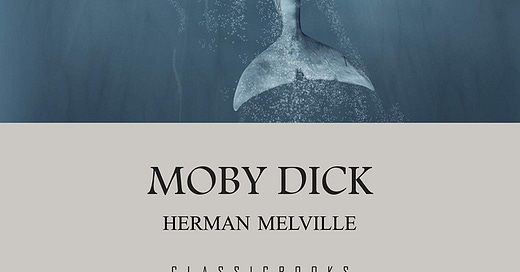The following unpublished essay was found at the estate sale of a little-known English professor who died in the early 1970s after a largely undistinguished career lecturing at a small school in northeast America. It is reprinted here with minimal alterations.
Heretofore, much has been written upon the nature of Ahab’s “white whale,” and his monomania therefor. However, as is commonly understood among the more enlightened portions of our trade, all rigorous systematic understandings of motivations and psychology must ground themselves in Freud’s method. Such meanderings of thought as have, until now, comprised our collective attempts to understand the great Captain’s psychology are therefore woefully without use. Unless we can find some way to interstitch them with a Freudian grounding.
What becomes clear from even a cursory look at Moby-Dick is the novel’s fecundity of psychoanalytic meaning.
We barely need delve deeper than the cover. Let us begin, as all readers ought, with the title: “Moby-Dick; or, the Whale.” Any reader must be immediately struck by the “Dick” therein: the phallus veritably reaches out at us as we but lay eyes upon the corpus.
Let us then consider that very Dick’s preface: “Moby.” It strikes me that this preface—more Melville’s own creation than the “Dick” which succeeds it—remains a mystery for my field. Well, no longer. For we must go no further than Melville’s favorite source of inspiration: the Bible. Moby is nothing more than a 19th-century rendition of “Moaby,” a reference to the Moab kingdom in biblical Levant. The meaning of Moab to which Melville would have been exposed is the traditional interpretation: Moab coming from Mo’ab, meaning “of the father.” “Moby-Dick,” then, means “fatherly phallus.”
Indeed, what is more phallic than the breaching whale which has traditionally adorned copies of Melville’s Oedipal masterpiece? The erect, breaching whale, tearing apart the surface of the treacherous, bottomless, chaotic, ever-birthing origin of all species: the yonic ocean. Moby-Dick, of course, unlike, vis-à-vis the book, and all the other whales therein, is white. This white, pale, massive thing. Forceful yet fleshy, thrusting through the watery womb of the earth. Not merely a whale, Moby-Dick is a sperm whale. The sperm whale contains a precious load: spermaceti, with both the primordial power to create (as oil for fire) and to seduce (with its aroma). Like a penis.
Ahab’s injury—his pegleg—comes from this massive penis tearing off his foot. The foot, of course, is a biblical euphemism for genitalia: Ahab has lost his own phallus and has attempted to replace it. Ahab’s desire for the phallus has led him to replace his own phallus with a prosthetic one. But this is dead whalebone, carved from a dead penis. Indeed, he loses a prosthetic leg and has it replaced with another. He is attempting to recover his lost penis by creating new penises out of dead penis bones. The Pequod is littered further with whalebone, showing further Ahab’s sense of phallic inadequacy next to the authoritary Moby-Dick.
Melville himself made the Oedipal undertones explicit with Ahab’s blindness. Ahab’s Luciferian visage (described as impious, diaboloc, and so on) further shows how Moby-Dick has replaced, for Ahab, the authority of the father—or, at the very least, the Father. Ahab is chasing the penis of his father and attempting to kill it. Where for other captains, the white whale is something to be feared, avoided, or disbelieved, Ahab has felt its power and wants to reject it in a rebellious fashion: by killing it.
Ahab has rejected all authority but his own—that of scripture, family, the corporation, and nature itself. He dismisses holy talk aboard his ship, quite unlike his fellow Quakers. Where Starbuck wishes to return to his family—partially emissions of his own phallus—and fulfill his obligations to them, Ahab rejects the authority of the family and continues on his quest. Ahab has little care for the purported purpose of the ship, making plain his lack of concern for his corporate masters. Ahab dismisses natural omens and imbues a natural creature (the whale) with a vindictive, human mind.
However, in chasing the penis of his father, Ahab endows it with the very authority for which he hates it. Because of his phallic envy, he organizes his entire psychology around the white whale. The idea of the whale bewitches the crew as much as Ahab does himself. Each of them creates the authority of the father by seeking it out—indeed, chasing it—rather than creating authority themselves with their own penises.
Now, you might ask, why does it matter that the whale is a penis? What does that tell us about Captain Ahab or revenge or humanity? Well, it grounds everything in the fundamental psychoanalytic workings of humanity, because everyone, of course, has a penis wants penis [The note continues, but it is illegible, scribbled over in pen.]




